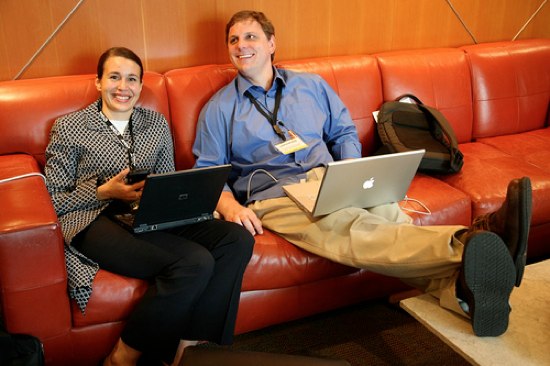
TechCrunch CEO Heather Harde announced her departure today.
I’m so angry.
Drift back to the end of 2006. TechCrunch was a year and a half old. My hobby had turned into a business. Federated Media was selling our standard ads and sent a small check every month. Nik Cubrilovic had “invented” the notion of a 125 pixel square ad that we’d sell for a flat rate, which was an unqualified success and was quickly copied by everyone else. We had enough money to have a staff, and things were looking pretty good.
But we had a massive hole in the organization. There was no sales team, and no one to handle all the important parts of a business. I began to recruit Heather Harde, an executive at Fox, to fill that hole. It took months before she agreed, but in March 2007 she was on board.
Heather was a perfect fit at TechCrunch. She’s dogged and ambitious and willing to take massively risky bets when it makes sense. She’s also the most even tempered, thoughtful person I know personally. Think Dalai Lama calm, even in the face of my monthly “the sky is falling” proclamations. No matter how messy things got, Heather just kept on marching, and everyone followed.
What I did right, and this is important, is I hired Heather to be my boss. That gave her the authority she needed to run the company. A lot of our competitors seemed more ego driven, with the blogger demanding to stay CEO. That meant they hired less awesome people, and then those people didn’t have the room to maneuver. As a result, we grew much more quickly than they did.
Revenue was marginal when she joined, maybe $500,000 in 2006. By the time we sold TechCrunch revenue was $10 million a year. And this last year under Aol Heather grew revenue by another 50% or, based on what I’ve seen reported.
Other than dial up, TechCrunch is/was the most profitable and fastest growing business unit inside of Aol.
That, ultimately, is why everything fell apart.
When I jointly announced CrunchFund with Aol a few months ago, everything was humming at TechCrunch. The core writing and business team was intact nearly a year after the acquisition, no small accomplishment. We were crushing our competition. Not just beating them but actually dominating the tech news space.
TechCrunch continued to get so much attention that, I later understood, it chafed Arianna Huffington. Even though TechCrunch reported to her, in her eyes any attention TechCrunch got was just less attention for her.
This became a turf war between me and Arianna Huffington, although I had no idea that there was a war going on until I’d lost it. Arianna made her classic political power move by publicly terminating me without approval or knowledge from Aol, and despite the fact that she’d already approved the CrunchFund announcement. My counter was to just blow the whole situation up and create chaos.
But I was also trying to carve TechCrunch away from Huffington Post via endless conversations with Aol. Give us the freedom to operate on our own, I begged, or sell TechCrunch back to us.
It seemed an easy thing to do. Aol’s multiple conflicting press statements left little doubt that things were a mess. But Aol, above all else, wanted to save face for Arianna. There would be no independence from HuffPo because Arianna would be upset. And TechCrunch was growing too fast, and was too profitable, to sell.
In other words, it makes perfect business sense to sacrifice TechCrunch and let it fall apart. The company has bet everything on Huffington, so anything that challenges her power, real or perceived, has to be destroyed.
If only Heather had slacked off that last year, and tanked the business. If that had happened, TechCrunch would almost certainly be independent and thriving today.
So it never happened. I “decided to move on“. Paul Carr resigned shortly afterward, and was knifed on the way out.
Then MG Siegler left to join me at CrunchFund. Heather and I (now as an outsider) worked hard to keep him at TechCrunch writing full time. But if he’d done that Huffington’s “principled” position on terminating me – that I was now an investor and could’t therefore write blog posts – no longer held water. So he was shuffled to the background, and TechCrunch lost the best tech writer on the planet. Siegler continues to write amazing content on his personal blog. All of that would be on TechCrunch, but for Arianna.
Then Sarah Lacy resigned in a hastily written blog post, afraid her credentials would be turned off like Carr’s were. How ridiculous that the people who built the site were, in the end, forced to run out the back door to preserve some dignity. I spent the last week before she resigned trying to find a way to keep her at TechCrunch.
And now Heather, who for some crazy reason stayed on at TechCrunch, dealing with constant verbal abuse from HuffPo execs (they refer to her by the “c” word over at HuffPo), just because it was the right thing to do.
It’s insane. She could do any job at AOL better than the person currently doing it. She should have been embraced and treasured. But Arianna had to…save face. So today Aol loses one of the only executives left in the company who actually knows how to run a business, profitably. I’d trade 100 Arianna’s for a Heather any day.
The body count at Aol is rising, and too many of these people were casualties of Arianna’s ego. Jon Brod was kicked to the curb for disagreeing with her about how to run the Huffington Post business. Brad Garlinghouse fell out of favor at least partially because he was the only one willing to call bullshit on her power grabs. And there are others.
Aol needs to decide whether it exists for the benefit of stockholders, users and employees, or whether it exists for the greater glorification of Arianna Huffington. She’s waging this political power war inside of Aol against anyone who stands “against” her. But no one’s fighting back because that’s not how they see the world. Instead they just drift off, to create real value at other companies who actually value them.
I’m still a shareholder in Aol (I bought stock earlier this year). I still believe that Tim Armstrong will figure this out and save the day. But the damage keeps piling up. It’s time to lead.
Photo Credit: Scott Beale
 A lot of
A lot of 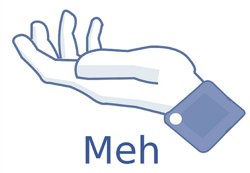 Location based service Gowalla is going to shut down at the end of January. The two founders, Josh Williams and Scott Raymond, will be
Location based service Gowalla is going to shut down at the end of January. The two founders, Josh Williams and Scott Raymond, will be  Things are a lot different today than they were in Marx’s time. Today’s labor gets to nibble on organic food, be pampered with acupuncturists, and generally be coddled like no other employees on the planet. And when they get frustrated, or it’s just their time, they go out and start companies of their own, take venture capital or not, and see what they’re made of.
Things are a lot different today than they were in Marx’s time. Today’s labor gets to nibble on organic food, be pampered with acupuncturists, and generally be coddled like no other employees on the planet. And when they get frustrated, or it’s just their time, they go out and start companies of their own, take venture capital or not, and see what they’re made of.
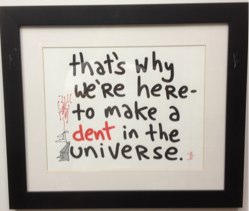
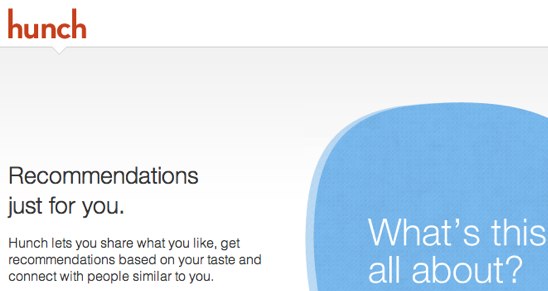


 Liz Welch at Inc. Magazine
Liz Welch at Inc. Magazine 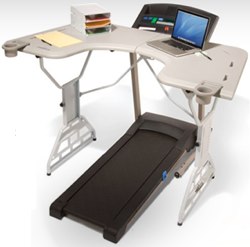 That prompted me to research
That prompted me to research  That’s not all though. I’m also using a
That’s not all though. I’m also using a  Things are just getting started. But the fact that I’m sleeping properly and have revamped my diet with my doctor, combined with actually walking miles and miles a day, has already had a profoundly positive effect on me.
Things are just getting started. But the fact that I’m sleeping properly and have revamped my diet with my doctor, combined with actually walking miles and miles a day, has already had a profoundly positive effect on me.